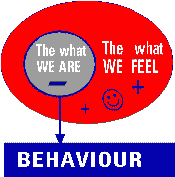The root of the biblical term for sin in Greek has the meaning of "failed goal" or "failure". What does failed "goal" consist of? In the answer we shall find an acceptable definition of sin. Jesus says:
"Everyone who drinks this water will be thirsty again, but whoever drinks the water I give him will never thirst. Indeed, the water I give him will become in him a spring of water welling up to eternal life." (John 4:13-14)
The principle of sin can never give what it promises - it can never satiate the thirst of a man's soul.
One can feel happiness in sin, but one cannot be happy in it. Feeling happy and being happy is not the same thing.

The feelings of happiness, no matter how strong or elevated they are, can never satiate, but can only deaden the thirst of man's soul. They can only repress the awareness about our inner discontent, but they cannot eliminate it.
The attempt of a man to satisfy the desires of his heart by means of pleasant experiences is as meaningless as the attempt of a thirsty man to satiate thirst by pouring buckets full of fresh water upon himself. The experience of dampness and wetness neither has the function to satiate the man's thirst nor can it achieve it.
In the same way in which a gift tells about the giver, the experience of dampness and wetness only tells that it is connected to water. But one should drink water and not only feel that it is wet. The feeling of happiness can tell us about God, but it cannot replace Him.
By saying this I do not mean at all to convince anyone that his feelings of happiness cannot be deep and sublime. But, I want us to understand that there is a criterion which will show us that no matter how long- lasting they are and disregarding the fact how strong and elevated they are, they will never be able to fulfill the function which we ascribe to them when we are in the state of sin.
Let us assume that, by means of simple pleasures of body or a complex religious system, we have attained blissful feeling of happiness.
But, what is there that shows us that we are still unhappy?
Our motives!
We are still selfish. We are still looking for happiness.

If we were happy, we would not be looking for happiness, but would be giving it away, expressing it in our life.
We would do the things that we normally do in our life because we are happy, and not for the sake of being happy. Instead by selfishness, we would be motivated by a true, unselfish love. Released from internal discontent, we would not be burdened any more by asking ourselves how we feel, but by asking the vital question: "What can I do for another human being?"

A man who is essentially discontent, he is looking for happiness that he does not have, and can give only what he has - unhappiness. That is why a sinful man has a need for a "psychic release". Only a mentally tense person has a need for such a release. He easily recognizes a negative experience of reality in order to find in it a motive for expression of his internal discontent. It does not make any difference whether he psychically release himself by taking part in a fight, or by watching others fight, or whether he is psychically discharging himself by listening to loud music, or in any other way. Pleasant feelings, which he has in these moments, cannot be reasonable excuse for his sins. Man is given reasonable and elevated criterion, by which he is able to realize his real spiritual state and be aware of his need for change.
"I would not have known what is to covet if the law had not said You shall not covet" (Romans 7.7).
As long as the motives of man's heart are not in harmony with the Ten commandments of God's moral law, a man will be essentially sinful, discontent and separated from God, no matter how pleasant and sublime he feels.
The obvious connection between our basic satisfaction and the basic motives for our behavior, shows that the biblical division of motives into the good and the bad ones is neither unfounded nor relative, but it is completely reasonable and functional. There is a difference between human codex of behavior which marks the forms of behavior or human intentions, and God's law which emphasizes the motives of human's heart and asks of them to be correct.